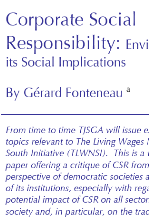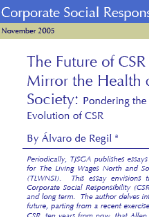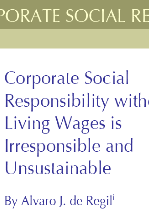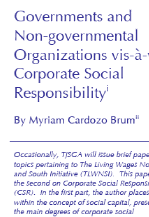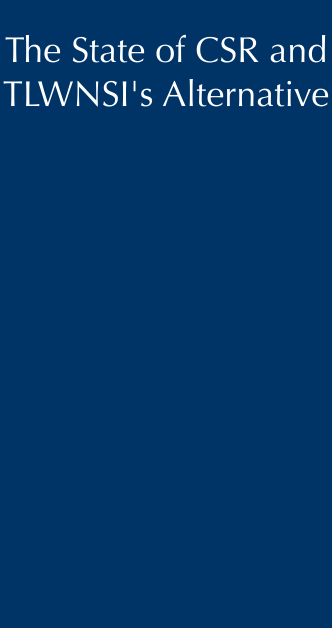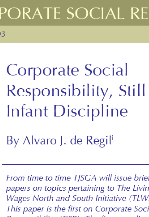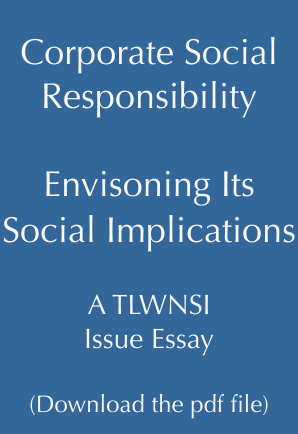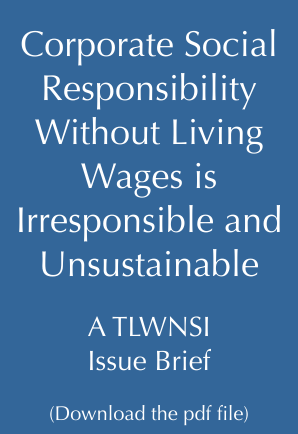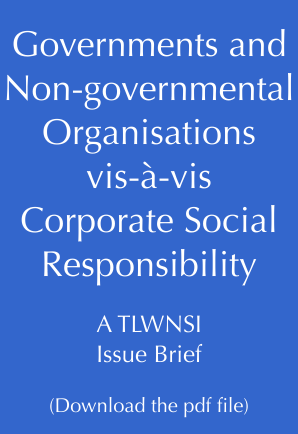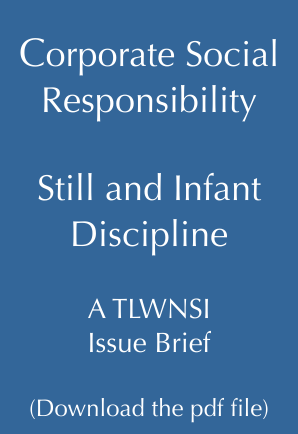The emergence of CSR notwithstanding, these are tough times in the struggle to make business behave responsibly, for, with the end of the post-war regulation paradigm, we have gone back to times of Victorian carriages, robber barons and Darwinian Capitalism. Indeed, in the last two decades of the twentieth century, we returned to an era of extreme corruption of the concept of liberty and we mocked democracy by giving untrammelled pre-eminence to corporations' interests and upholding their "right" to profit over people.
CSR roots
Unfortunately, political ambitions and corruption gradually eroded the governments' brief will to fulfil their regulatory responsibility and act as "balancing agents" to control the natural excesses of the market system, and, with the U.S. abandonment of the gold standard, we began our move to the so-called post-modern globalisation. In this way, most people now endure a zero-sum game ethos, where the great beneficiaries are the global corporations. These great economic powerhouses increasingly resemble, through never-ending mergers and acquisitions and their day-to-day corporate practices, the big trusts of the nineteenth-century or the spice monopolies of the merchant era, and dictate in many ways the agendas of the governments in the world. To be sure, corporations instinctually reject any type of social responsibility by arguing that that is the governments business; but ironically, they have made governments abandon their regulatory responsibility to procure the welfare of all ranks of society. A tridimensional pervasiveness: the argument for the need for corporate social responsibility The fact is that corporations cannot elude their social responsibility because their activity exerts a tridimensional impact (economic, social and environmental). Their huge political influence has made governments abandon their basic responsibilities, which results in very negative pervasive and tridimensional effects. The now common practice of financing political campaigns has replaced, de facto, the social contract with a corporate one, where those who provide the moneys dictate the topics and direction of the governments' agenda. This is now a reality in many parts of the world, in developed and Third World countries alike. The huge fraud of the banking system in Mexico, increasing its public debt by more than $80 billion, rescued crony investors and assured an annual income to their new foreign owners at the expense of taxpayers. The corrupt privatisation of almost all public assets in Argentina and the outright robbery of the banking deposits of millions of Argentineans brought upon the most developed nation in Iberian America its worst crisis in history. The "laissez-faire" attitude of European pharmaceutical industry's regulators, the "drugs agencies", who do not carry out their own studies to ensure that new drugs indeed bring real benefits to patients and not just extra profits to drug firms, ensure the very private welfare of the industry giants.1 All these cases fall into the same category as the Enron and Worldcom fraudulent bankruptcies or the U.S. State Department demand to a U.S. federal court to dismiss a human rights lawsuit by Indonesian villagers against Exxon Mobil, saying a trial could harm U.S. economic and political interests in Asia.2 The common thread is the lack of corporate accountability due to the extreme corruption of governments, which has moved them to abandon their social responsibility for the sake of very private interests, including their own self-interest. The social contract is now a corporate dictate. The trafficking of corporate interests has overtaken the political structures of nations on a global scale. Indeed, the Washington Consensus: the maximum reduction of the public role, through the elimination of the welfare state and economic deregulation, so that governments become mere agents of corporate interests, is just the basic demand. The ultimate goal is to make corporate interests explicitly prevail over the common good, allowing corporations to legally sue sovereign states, as in Metalclad's victory over Mexico through NAFTA.3 These events are possible because democracy in the world has been corrupted to its core. There is no trace of the old Greek concept of the agora, the place where public and private interests were reconciled, because the public interest has been privatized and now governments discuss it in private with the world's centres of private capital. In lieu of the overwhelming lack of will of most governments to fulfil their most basic responsibilities, it has become of utmost importance that Global Civil Society (GSC) takes the responsibility -as is increasingly happening in many other aspects of life in today's societies- of closely overseeing the behaviour of corporations. In this way, since the early 1990s GCS has mobilized to ensure that the common good and the basic principle of democratic governance, of pursuing the welfare of all ranks of society, remains firmly above the pursuit of very private interests. In true democracy, companies cannot ignore societies in any of the social spheres where they interact. This is because they are formed and managed by individual members of society, because their raison d'être, the accumulation of capital, is only possible due to the existence of these societies, which constitute their markets, and, especially, because their activities have a tridimensional impact on societies and their habitat. The most distinctive feature of the concept of CSR, that every private enterprise has a legitimate diversity of stakeholders, is in stark contrast with the traditional private sector position of considering shareholders their only stakeholders. In CSR, the stakeholders represent the different interests groups of society where corporations operate, be they workers, consumers, social justice NGOs, environmentalists, indigenous groups and so on, all with a legitimate right to demand socially responsible corporate behaviour. In the new GCS, corporations represent the corporate citizen,4 who, as anybody, is subject to rules and must be socially responsible. Therefore, the stakeholders are all the members belonging to the corporation's social environs, which contribute to, or are encroached by, the corporation's activity.5 In this way, Corporate Social Responsibility is the inherent obligation of each business entity to account for the way its activity impacts the economic, social and environmental dimensions of its environs and to ensure that this impact generates equitable and sustainable benefits -and no harm- to all stakeholders involved.
The last decade experienced rapid growth in the efforts to develop and establish CSR in the North, an event that is also having a strong impact in the South due to the important presence of MNCs in this region. However, CSR is a discipline still in its infant state, where many legitimate stakeholders spontaneously emerge to develop their CSR concept from their own perspective. This typically has occurred without coordination with other stakeholders and other CSR developers. Thus, although the need to coordinate the development of CSR and agree on the criteria and methodology for its application has been recognized, and much progress has been made, there is still need for refinement and upgrading. In the management of a CSR process, there are four phases to be followed by corporations and GCS: planning, reporting, verification and certification. Planning and reporting require defining and jointly agreeing on the selection of the criteria that will be applied in the evaluation and in the reporting of a company's tridimensional impact. Unfortunately, the power of persuasion of the Northern initiatives leaves these phases in a state still rather bleak. A common weakness is to offer corporations a set of CSR standards to be used on a voluntary basis and with great latitude in its application. This incites many corporations to see a great window of opportunity to portray themselves as good corporate citizens and shield criticism from GCS. It is a great opportunity to behave politically correct without really being socially responsible. Furthermore, the other major common weakness, and a major void in the development of criteria, is the absence of a norm and/or of an indicator of the quality of the wages paid. This is a critical issue given the fact that a living wage is a basic human right, and, thus, must be a fundamental element of CSR. Typically, regarding labour rights, CSR standards adhere to the International Labour Organisation core conventions. However, the ILO does not deal with the issue of living wages. This provides a loophole to avoid the issue of fair labour endowments and still look good. The right thing to do must be that, if a corporation complies with the ILO but strategically exploits its workers, it cannot be considered socially responsible because it is playing a zero-sum game, even if it is managing the impact of all the other elements -in addition to those of the ILO- in a very responsible manner. Yet this criterion is still absent from most CSR concepts emerging in the public arena. The other two phases: assurance and certification, also suffer from a lack of standardisation in the process of verification and the criteria to be used for granting or denying certification. Before the financial reporting scandals of 2002, there was a developing trend, in the case of multinationals such as Disney, Nike and Mattel, to hire firms such as PWC, Andersen, Ernst & Young and others in locations such as in the province of Guangdon in China, to conduct social accountability audits in their plants.6 However, the scandals of Enron, Worldcom and others, in their relationship with accounting/auditing firms, brought discredit to the use of these consulting firms in the verification of compliance with a set of CSR standards. Now the trend is to develop independent assurance providers that will only be accountable to civil society, but, as a natural consequence of the infancy of CSR, this is still in its first stage. Fortunately, much effort is being done in this area to establish systematic processes of verification and train those who will actually execute them in the field. Nonetheless, until now total consensus in the criteria to audit and certify has not been achieved; thus, standardisation is still incomplete. While there is diversity in emphasis and specialisation in the development and management of CSR by GCS, the timidity in demanding that the impact of corporate activity generates equitable benefits for all stakeholders is very evident. Often enough, the mission in the promotion of CSR appears to be more the offering of a vehicle for companies to be perceived positively, without true congruence with the intended principles of social responsibility, instead of demanding an equitable and sustainable tridimensional impact. The voluntary approach to CSR, the latitude enjoyed by corporations in its application, the lack of homogenous standards and process, and, especially, the clear avoidance of living wages -the fundamental element of social justice and a key factor in the achievement of an equitable and sustainable system- makes CSR still innocuous in our quest for true democracy and sustainability. Since we initially wrote this section, we now believe that unless we, the citizenry, in our role as consumers, become permanently involved in curving corporate behaviour –by putting direct pressure on the companies to change their business culture and their so-called "best" business practices– to stop the current customary predatory system of exploitation, CSR will become a moot point in the pursuit of true and holistic sustainability, and will be perceived as a mere cosmetic gimmick that business used in its unsuccessful attempt to deceive society.
For other CSR sources available on the web: our page in our Resources section. |
- © The Jus Semper Global Alliance

